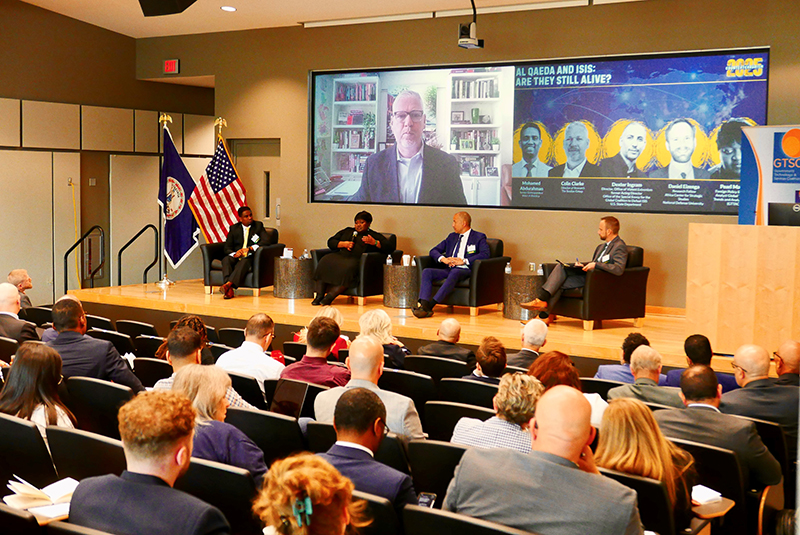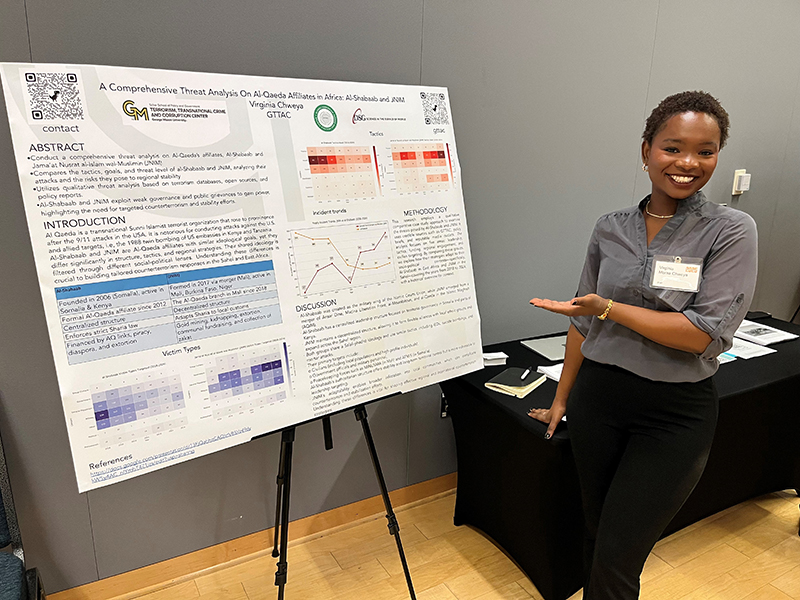In This Story

Earlier this month, the battlelines of global counterterrorism were redrawn—not in war-torn deserts or drone-filled skies, but in panel discussions in an auditorium and during a data-rich poster presentation at a major counterterrorism conference hosted by George Mason University, near Washington, D.C.
The daylong conference at Mason Square in Arlington, Virginia, simply titled “Counterterrorism Summit 2025,” was organized by Schar School of Policy and Government research associate professor Mahmut Cengiz, principal investigator of the Global Terrorism Trends and Analysis Center (GTTAC), a unit of George Mason’s renowned Terrorism, Transnational Crime and Corruption Center. The event was organized in partnership with McLean, Virginia-based digital media outlet Homeland Security Today.
The event brought together an international array of experts to probe the threats the world faces, to illuminate the weapons needed to combat terrorism, and, perhaps most crucially, to hear the stories that make the effort to thwart terrorism so crucial.
“The summit was designed to foster a multidimensional dialogue on counterterrorism by integrating diverse scholarly and policy-oriented perspectives,” said Cengiz after the event. “It successfully facilitated critical discussions on pressing global terrorism issues.”
And it wasn’t just the seasoned professionals doing the talking.
“It was a source of pride to witness George Mason University students actively contributing to panel discussions alongside leading terrorism scholars,” Cengiz added. “Their participation, complemented by 14 high-quality, data-driven poster presentations, exemplified the research excellence we aim to cultivate.”
The event began with opening remarks by Schar School dean Mark J. Rozell and featured panels hosted by school faculty and students, including Professor Guadalupe Correa-Cabrera and Associate Professor Gregory Koblentz, director of the biodefense graduate program, as well as Cengiz.
Africa: Where Terror Grows in Silence
If the summit had a theme, it was this: terror mutates. Nowhere is this clearer than in Africa, where ISIS-DRC and Al-Shabaab continue to thrive in fragile states.
“ISIS-DRC, over a four-year period, have killed over 8,000 people,” said Pearl Matibe, a researcher at the GTTAC and a 2024 graduate of the Schar School’s Government and International Politics program. “They weaponize local issues and use ISIS-core propaganda to expand and grow.”
She warned that their bloodlust is amplified by a craving for media attention: “If their terrorist attacks are not given coverage or talked about, they will get angry and commit more attacks, burning down villages and beheading civilians.”
Somalia’s woes were summed up by Voice of America multimedia journalist Mohamed Abdurahman: “Al-Shabaab remains a great threat to Somalia and the rest of East Africa.”
Dexter Ingram, director at the U.S. Department of State’s Office of Violent Extremism and a member of the Homeland Security Today editorial board, revealed a disturbing truth from the front lines of radicalization.
“I remember going to Syria and talking to kids,” he said. “At one point, I asked ‘How many of you think that violence is the solution to the war problem?’ Seventy percent of them said yes. We did some work with them, introduced them to educational programming like PBS, and afterward only 30 percent kept the same answer. These results are tangible”
Warfare Isn’t What It Used to Be
For Ajit Maan, founder of Narrative Strategies, a collation of scholars and military professionals focused on the narrative foundation of conflict, the battlefield isn’t on the ground—it’s in the mind.
“We are not in information warfare, we are in narrative warfare,” she said. “They tell stories. They find trusted narrators. They anchor those stories in meaning. And then they trigger a preferred identity in the listener—one better than the one they already have. That’s influence.”
Suha Hassen, a 2024 doctoral graduate from George Mason’s Jimmy and Rosalynn Carter School for Peace and Conflict Resolution, noted that the fight against terrorism is “no longer just military. It is a war against invisibility.”
Terrorists, she said, live in the past and are “just empty vessels…Digital propaganda collapses time, making a person feel they are living inside history, not modern reality.”
Howard Gambrill Clark, associate professor in the college of information and cyberspace at National Defense University, offered that “our innocence under attack may offer an outlet for those facing crisis of meaning, purpose, and identity.”
Influence, he said, is “existential to terrorist organizations.”
Iran's Web: Hamas, Hezbollah, Houthis
Turning to the Middle East, GTTAC senior research scientist Eoin Healy said that the October 7 attack in Israel by Hamas was the most complex incident ever recorded in the GTTAC database, with Hamas executing 37 coordinated attacks using everything from rockets to motorcycles.
Mahmoud Shehrah, an associate fellow at Chatham House, painted a sobering picture of the Houthis in Yemen: “They are not just a normal militant group. They are controlling a large territory populated with 25 million people…The Houthis take 100 percent taxation with zero representation.”
And why is Iran backing Sunni Hamas, despite sectarian divisions? Mubin Shaikh, a former undercover operative for the Canadian Security Intelligence Service, summed it up: “The enemy of my enemy is a friend.”
Narcos, Networks, and North America
Stateside concerns weren’t ignored. Stephen T. Maloney of the National Targeting Center noted that “you are more likely to be struck by lightning twice before your phone gets checked at airport security,” raising eyebrows about security theater and gaps in off-ramping youth from radical paths.
Meanwhile, panels on narco-terrorism warned that the drug cartels’ Foreign Terrorist Organization (FTO) designation may expand U.S. counterterrorism policy in unintended ways. David Luna of the International Coalition Against Illicit Economies minced no words: “We need to put Chinese money-laundering organizations on the FTO list. They are the biggest threat to American security.”
Senior fellow at the Brookings Institution Vanda Felbab-Brown added that the designation might create collateral consequences.
“Drug users in the United States can be charged with material support clauses or as co-conspirators with terrorists, which can lead to mass incarceration,” she said.
Additional reporting by Buzz McClain, Schar School of Policy and Government

